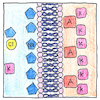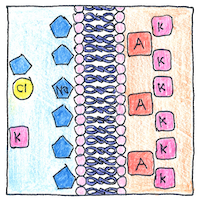Claude Bernard
metabolism

|
Regulating the body
The body regulates its own oxygen supply, they say; complex physiological mechanisms try to keep temperature, liquid pressure, and chemical processes in balance. This was the finding of the famous French physiologist Claude Bernard, who abjured hospital practice and advocated the laboratory for experiments with animals, thus establishing the basis of medical science and saving countless human lives. If the frog and rabbit bore no resemblance to us then dissecting them would teach us nothing. Of course we have a lot to learn if we think that the animal teaches us all we need to know. Squeamish, I get faint at the sight of another person’s blood. Even on film. I can’t breathe, or maybe I breathe too much.
Milieu interieur
Ill or in motion, the body’s akilter. Every tick of the clock winds it down; every sense and swallow pushes it off balance. Reactions accumulate in a dim choreography but the center of the dance is not the self but, even in sleep, a point between the body and the sheets. Listen to the breathing. Breath derives from spirit—for the spirit animates, the air that we share. Difficult, when people are rude, blind to everything except for their own. It can hurt even if one knows they are wrong.
Fact and ritual
Dissatisfaction is inevitable so some anticipate failure with fervor, hoping, at the same time, for the best. No special pathology needs to be attributed; a worse case is always available to reassure the loser. Old injuries form badges of courage and symbols of veneration. The familiar rote learning of childhood— multiplication tables, nursery rhymes, rules of hopscotch— color our world with depth and warmth, unlike futuristic complexities that we fear to accept. The key element of the scientific method is approximation, not experiment. To shorten the calculation, we simplify the model. Predicting the weather or side effects of a medicine shouldn’t be matters of life and death. Making do with incomplete knowledge, inadequate explanations, ineffective control, we cannot be satisfied. But compromise is inevitable, and we can get used to anything.



Claude Bernard was the first to introduce the concept of homeostasis (or, as he called it, milieu intérieur), the idea that the body is a self-regulating system.
Claude Bernard was also one of the first to emphasize experiments with animals and insist on scientific methods for medical research. He was the primary proponent of vivisection in Europe, and his wife left him because she disagreed with this practice.
See also in The book of science:
Readings in wikipedia: